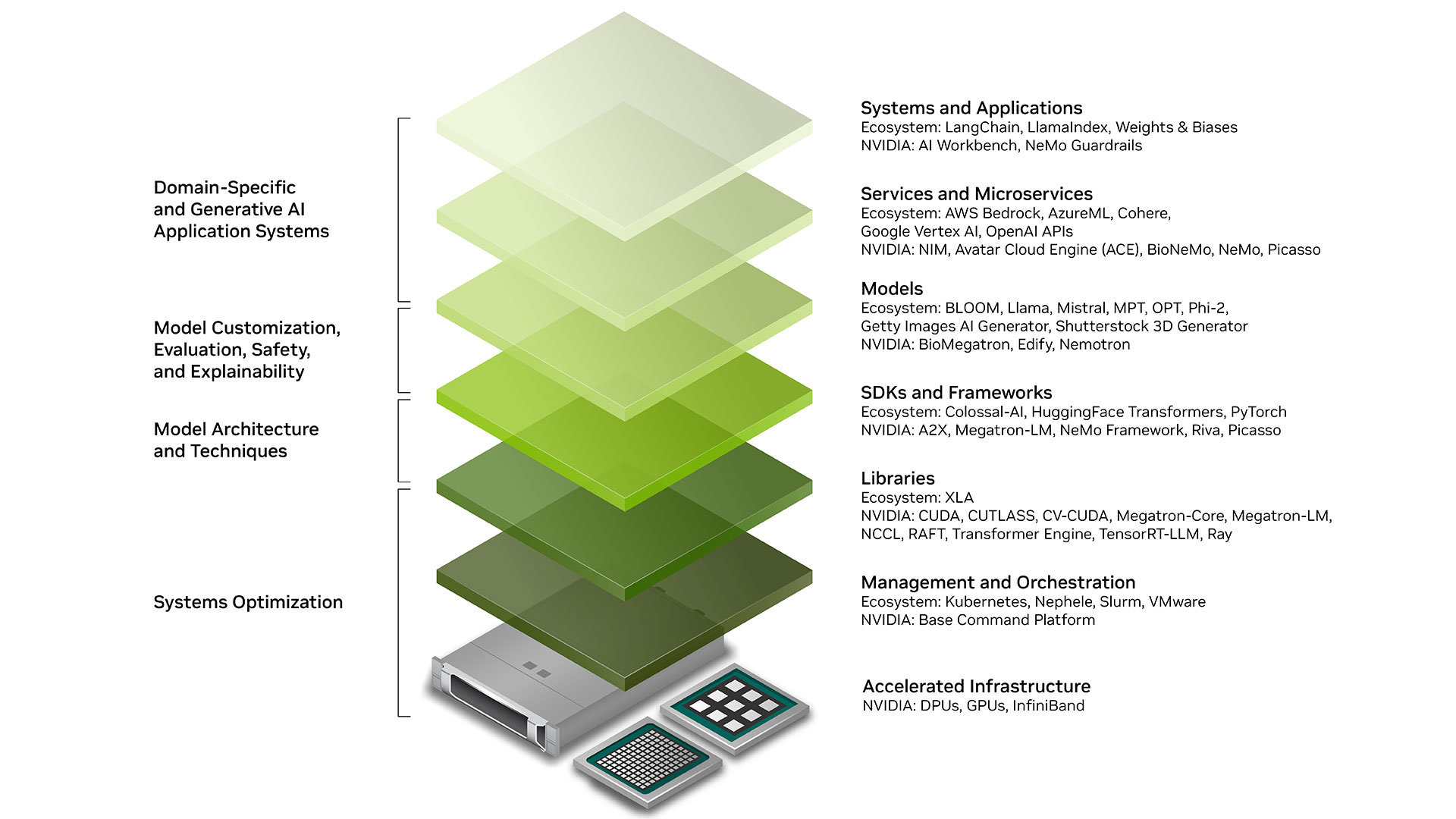How Generative AI Works
Generative AI models learn by recognizing patterns and structures within massive datasets of text, code, images, audio, video, and other data. These models use neural networks, often transformer networks, to process the information. Developers can then leverage the models to generate new content, enhance existing content, or create entirely new AI-powered applications. Retrieval-augmented generation (RAG) takes this further by integrating external knowledge sources, enabling AI to retrieve and synthesize up-to-date and contextually relevant information. This approach improves accuracy and can be used for tasks like creating realistic images from text descriptions, generating musical compositions, or building intelligent AI chatbots that can engage in human-like conversations.
Explore RAG Tools and TechnologiesExplore Generative AI Tools and Technologies
NVIDIA NIM
NVIDIA NIM? is a set of easy-to-use microservices designed to accelerate the deployment of generative AI models across any cloud or data center.
NVIDIA AI Blueprints
NVIDIA AI Blueprints are comprehensive reference workflows that accelerate AI application development and deployment. They feature NVIDIA acceleration libraries, SDKs, and microservices for AI agents, digital twins, and more.
AI-Q NVIDIA AI Blueprint
AI-Q is an NVIDIA AI Blueprint for connecting, evaluating, and accelerating teams of AI agents. It includes the open-source NVIDIA AgentIQ toolkit to profile and enhance the accuracy of agentic systems.
NVIDIA Cosmos
NVIDIA Cosmos? is a platform of state-of-the-art generative world foundation models and data processing pipelines that accelerate the development of highly performant physical AI systems such as robots and self-driving cars.
NVIDIA TensorRT
NVIDIA TensorRT? is an ecosystem of APIs for high-performance deep learning inference. TensorRT includes an inference runtime and model optimizations that deliver low latency and high throughput for production applications.
NVIDIA Triton Inference Server
NVIDIA Triton? Inference Server, part of the NVIDIA AI platform and available with NVIDIA AI Enterprise, is open-source software that standardizes AI model deployment and execution across every workload.
NVIDIA Maxine
NVIDIA Maxine? is a collection of NIM microservices and SDKs for deploying AI features that enhance audio and video for real-time communications platforms and post-production.
NVIDIA Riva
NVIDIA Riva is a GPU-accelerated multilingual speech and translation AI SDK for building and deploying fully customizable, real-time conversational AI pipelines.
Build, Customize, and Deploy, Generative AI With NVIDIA NeMo
NVIDIA NeMo Curator
NVIDIA NeMo? Curator improves generative AI model accuracy by processing text, image, and video data at scale for training and customization. It also provides pre-built pipelines for generating synthetic data to customize and evaluate generative AI systems.
NVIDIA NeMo Customizer
NVIDIA NeMo Customizer is a high-performance, scalable microservice that simplifies fine-tuning and alignment of AI models for domain-specific use cases, making it easier to adopt generative AI across industries.
NVIDIA NeMo Evaluator
NVIDIA NeMo Evaluator provides a microservice for assessing generative AI models and pipelines across academic and custom benchmarks on any platform.
NVIDIA NeMo Retriever
NVIDIA NeMo Retriever is a collection of generative AI microservices that enable organizations to seamlessly connect custom models to diverse business data and deliver highly accurate responses.
NVIDIA NeMo Guardrails
NVIDIA NeMo Guardrails orchestrates dialog management, ensuring accuracy, appropriateness, and security in smart applications with LLMs. It safeguards organizations overseeing generative AI systems.
NVIDIA NeMo Framework
NVIDIA NeMo framework provides extensive configurability with advanced training and RL techniques. The addition of NeMo-Aligner allows building and customizing reasoning and generative AI models.
